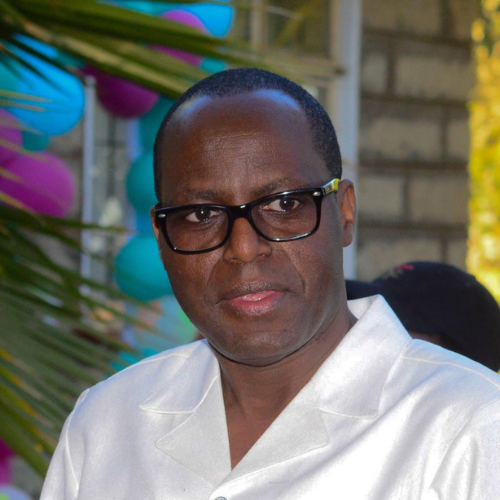
Dickson Ntwiga is an award-winning social entrepreneur, former high school teacher, lecturer and human rights activist who is working in Kenya to empower disadvantaged women and their families. Through training, education, and micro-credit programs, Dickson’s organisation Solidarity International Trust (SIT) has helped thousands of disadvantaged women to overcome poverty and take back control of their lives.
Kenya is a highly patriarchal society where according to Oxfam only 6% of women own lands and about 96% work on farms. This disadvantageous pattern of land ownership in Kenya has negatively impacted Kenya’s gender equality scene. Recently, Human Rights Watch has documented unprecedented and widespread violence against women in Kenya.
Dickson wants to break this cycle of violence against women and improve gender equality in Kenya.
“When you empower women, you empower the entire community,” Dickson said, “our micro-credit program aimed to provide financial empowerment to women, and we train them how to invest and how to get engaged in agriculture.”
Agriculture products top Kenya’s billions of dollars worth of export products for Kenya. Wealthy countries need to do more to support these efforts by, for example, investing more in developing countries like Kenya in order to create job opportunities for the many migrants travelling abroad in search of work.
Dickson believes in talking less and doing more. As such, human rights activists and institutions need to get their hands dirty — there is an urgent need for practical approaches toward finding solutions to the many challenges in today’s world. Human rights activists everywhere must uphold morality in their quest to promote and protect human rights worldwide.
Born and brought up in Kenya, Dickson’s traumatic childhood experience where he endured separation from his mother and saw his mother being subject to repeated domestic violence have shaped his current vision.
“I saw my mother was beaten as a child, and I was living with my dad and stepmother. I couldn’t understand why my stepdad was beating up my mom.” At the age of 10, he saw his mother didn’t find any support in the community because of Kenya’s patriarchal culture. “When my mom went to seek help from Police, they said, it is not a criminal matter, it’s a domestic problem, go solve it,” Dickson said, “I wanted to help my mother, but I couldn’t, I was too small.” This led him to research on how victims of domestic violence can be protected in international law. His findings are published in his book entitled Protecting Domestic Violence Victims in US Asylum Law.
Dickson began his career as a high school language teacher in Kenya, and in 1996 he left Kenya for Thailand. He was in charge of the migration and refugee program of the Thai Catholic Commission. In Thailand, he encountered multiple sufferings of the migrants who were not granted refugee status. “I remember seeing people on the streets. They are from everywhere — Iraq, Afghanistan, Congo, and it made a long-lasting impact on me.”
Dickson is an alumni of Mahidol University and Oxford University, where he studied human rights and forced migration respectively.
In 2004 Dickson joined a DTP training program in Indonesia. That training program was truly enriching for him.
“It was an invaluable experience. I met activists from other countries. Came to know about various international mechanisms for protecting and engaging migrants,” Dickson said.
He said there was a practical part in that training program, and they witnessed exploitation of migrants in terminal 3 in an Indonesian airport. They supported local advocacy to stop and improve the situation. The authorities accepted it and appropriate reforms were undertaken.
“That is why the DTP training program inspired me. It encouraged me. It showed people could work together. Even in a difficult situation, we can change things for the better. This was an eye-opener for me,” Dickson said.
Dickson suggests that the DTP should initiate training programs in Africa. DTP could work on two fronts. It could increase awareness among many women who travel to the Middle East and are severely abused. DTP could also train those who work on the Kakuma refugee camp in Kenya, where refugees from Somalia, South Sudan, and Ethiopia live. Migrants heading particularly to Europe is yet another vulnerable group requiring DTP’s attention and assistance.
In 2015 Dickson was awarded the Leading Women of Africa’s Award. For Dickson, it’s an inspiration to his life’s mission to elevate women’s status. When needed, he couldn’t help his mother, but now he is in a position to help thousands of mothers.
DTP acknowledges the traditional custodians of the land on which we work, the Bedegal people of the Eora Nation. We recognise their lands were never ceded, and we acknowledge their struggles for recognition and rights and pay our respects to the Elders – past, present – and the youth who are working towards a brighter tomorrow. This continent always was and always will be Aboriginal land.
Aboriginal and Torres Strait Islander peoples should be aware that this website contains images or names of people who have passed away.
DTP acknowledges the traditional custodians of the land on which we work, the Bedegal people of the Eora Nation. We recognise their lands were never ceded, and we acknowledge their struggles for recognition and rights and pay our respects to the Elders – past, present – and the youth who are working towards a brighter tomorrow. This continent always was and always will be Aboriginal land.
Aboriginal and Torres Strait Islander peoples should be aware that this website contains images or names of people who have passed away.
Privacy Policy | Terms of Use | Disclaimer | Policies
© 2022 Diplomacy Training Program | ABN 31 003 925 148 | Web Design by Studio Clvr